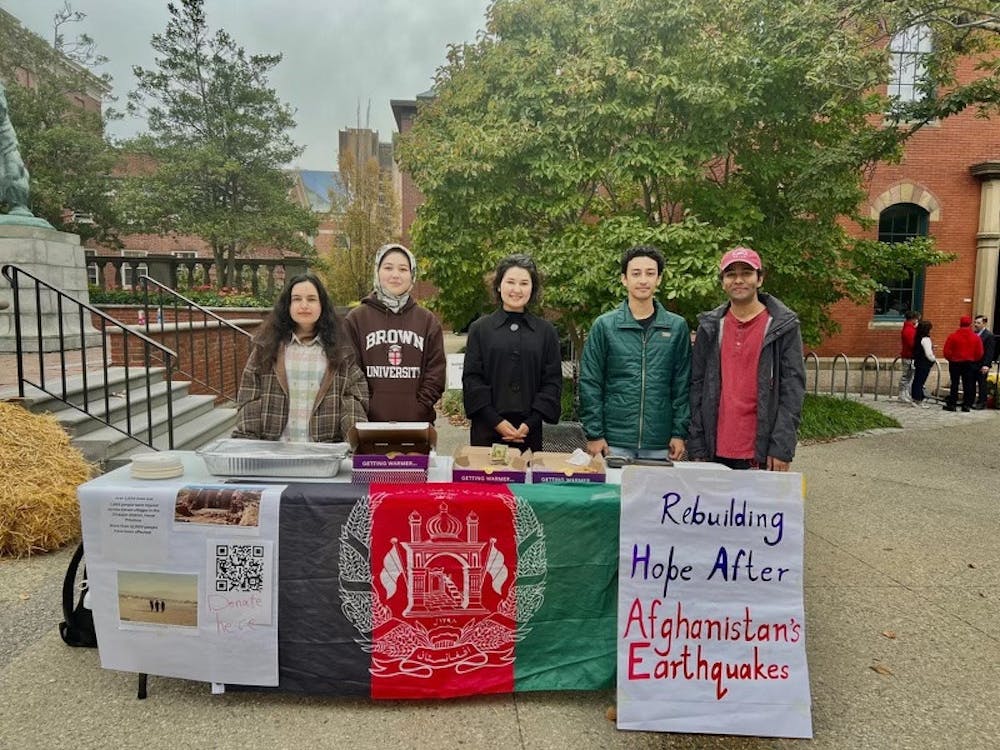On Saturday, Oct. 7, a magnitude 6.3 earthquake hit the Zinda Jan district of Afghanistan’s Herat Province. The initial shock was quickly followed by three powerful aftershocks of magnitudes 5.5, 6.3 and 5.9.
Only a day after the aftershocks, the United Nations Office for the Coordination of Humanitarian Affairs reported 1,023 deaths and 1,663 injuries, as well as demolished infrastructure, across 11 villages in the Zinda Jan District. As of Tuesday, Oct. 17, the United Nations has reported nearly 1,500 deaths.
Suhaila Hashimi ’25.5, who is from Afghanistan, knew she wanted to fundraise for the earthquake’s victims the minute she heard news of the disaster. Last Wednesday, she connected with Fatima Rezaie GS, who is from Herat and has family in the affected region, and together they recruited Nazifa Qazizada ’25.5 from Afghanistan and Rhitama Basak GS and Suraiya Hamidzada GS from India to begin coordinating fundraising efforts.
Over the weekend, the students organized a GoFundMe campaign and a fundraising table — the proceeds from which will be donated to on-the-ground organizations such as the Qamar Foundation. Benefiting from the crowds drawn in by Family Weekend, the group has currently raised over $3,000 for earthquake relief, Rezaie said.
While the weather was unfavorable on Saturday, Hashimi couldn’t help but remember the “people (in Afghanistan) who have nowhere to go. People who have no food, no warm clothes.”
“At least I know … I can go lay down on my bed, or turn on the heater,” she said.
The students are also considering the possibility of donating supplies to individuals in Afghanistan, particularly sanitary products for women and children, according to Hashimi. According to the U.N., over 90% of the people killed in the earthquake were women and children — who were most likely to be home during the morning hours when the earthquake first hit.
The series of shocks on Oct. 7 were followed by more aftershocks last Wednesday and this Sunday, both magnitude 6.3.
“We (had) all hoped that the earthquake was over. … We were supposed to return home, but when the (aftershock) happened (Saturday) morning, we were disappointed,” Tahereh Moradian, who lives in Afghanistan, wrote in a message to The Herald. Moradian’s message was originally written in Persian and later translated into English.
Mostafa, who lives in the Jebrael locality and did not share his last name due to safety concerns, described Wednesday’s aftershock as “a bitter and terrible experience.”
“My heart was beating fast, sometimes I would laugh out of sheer nervousness from the fear,” Mostafa expressed to The Herald through a message originally written in Persian and later translated into English.
Moradian, who rushed outside and heard her neighbors screaming when the initial shock hit, has developed a headache that has not gone away even with the use of pain relievers. The ground still seemed to be shaking even after the shock, Moradian wrote.
OCHA reported up to 66,000 lives “upended” as a result of the earthquake and its aftershocks. The U.N. also reported that an estimated 100% of homes across Zinda Jan’s 11 villages were completely destroyed.
Due to “insufficient infrastructure,” the houses in the region are mainly “made of mud” and unable to endure such a severe disaster, Rezaie said.
The homes at the center of the earthquake were “totally flattened as if there hadn’t been any people living there,” she added.
Currently, Moradian’s family is staying in a tent in a relative’s yard. While there are no elders or children in her own family, Moradian wrote that the recent cold spell in the country has proven difficult for neighbors: “It’s tough for them. The children have caught colds.”
Both Moradian and Mostafa wrote that they had not received substantial aid and emphasized that civilians across the district are in need of “tents, warm clothes, clean drinking water and food,” Moradian wrote.
As a result, some civilians have begun turning to each other for help: “People did not spare any effort to help the earthquake victims of Zinda Jan district and other districts,” Moradian said. “Neighbors around us also help … by lending their extra tents to others and warm clothes for children.”
With the devastation wrought by the earthquake, it has been hard for Rezaie to focus on her life at Brown. “I’m physically here but mentally, my thoughts are in my hometown,” she explained. “Whenever I have the chance, I'm always checking in.”
For Rezaie, the earthquake has brought forth similar sentiments to when the Taliban seized power in Afghanistan in 2021 following the United States and NATO withdrawing their troops from the country: “The same horror, the same … fear,” she said.
“I was really shocked. How come amid all this crisis that we already have, this natural crisis is also happening?” said Rezaie, who has been unable to return home to Afghanistan for nearly four years.
Upon finding out about the earthquake, Rezaie immediately contacted her parents and friends in Afghanistan, who are currently living in small outdoor tents in anticipation of more aftershocks. They cook with small portable stoves with gas or with wood, Rezaie explained.
“I'm glad that we did this,” Hashimi said in reference to the fundraiser. “It’s not something that I'm doing for myself. … It’s something that I’m doing for a bigger community.”
The students plan to further spread their GoFundMe campaign with the help of social media and campus organizations such as the Global Brown Center for International Students and the Muslim Students’ Association, Rezaie said.
“It’s just so heartbreaking for me to see” news of the earthquake, Rezaie said. “We have had enough catastrophe.”

Kathy Wang was the senior editor of community of The Brown Daily Herald's 134th Editorial Board. She previously covered student government and international student life as a University News editor. When she's not at The Herald, you can find her watching cooking videos or writing creative nonfiction.





